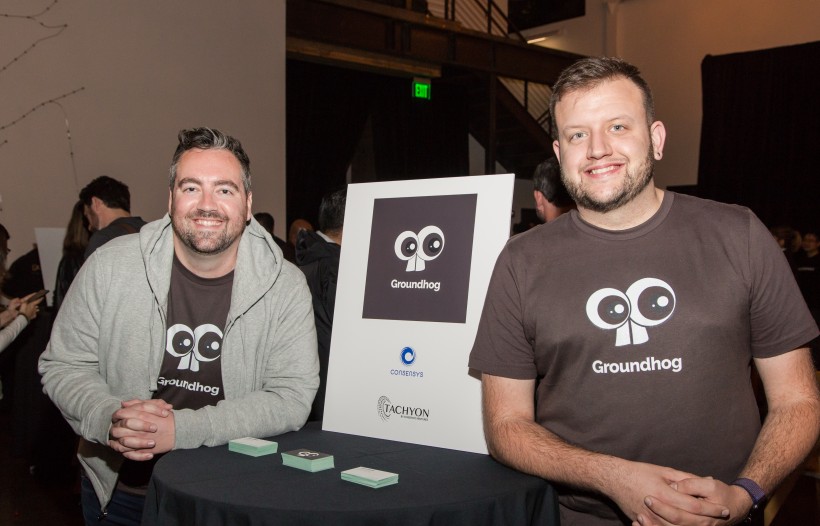Halifax startup Groundhog, which is developing technology to allow recurring cryptocurrency payments, is suing the parent company of California accelerator Tachyon, alleging breaches of contract and theft of trade secrets.
Groundhog -- incorporated under the name BlockCrushr Labs -- was part of the accelerator’s fall 2018 cohort and received US$100,000 (C$135,000) of investment from Tachyon owner ConsenSys Inc.
The lawsuit, filed in ConsenSys’s home state of New York, is alleging that Tachyon used its access to BlockCrushr’s corporate secrets to launch a competing product before the Halifax company could launch its Groundhog Pay product.
“[The] Defendants, using their position of trust and posing as investors and mentors for BlockCrushr, misappropriated valuable trade secrets and launched an identical, competing product the day before BlockCrushr was set to publicly launch its product,” said Groundhog’s law firm, Roche Cyrulnik Freedman LLP, in the lawsuit.
Cryptocurrencies are a type of digital money that allow transactions to be tracked in a de-centralized “ledger,” making fraud more difficult. To preserve their value, the creation of new currency is often tied to the completion of time-consuming and resource-intensive digital calculations in a process called “mining.”
Groundhog is designed to let users pay recurring bills, such as video streaming subscriptions, with a cryptocurrency called Ethereum -- the second largest cryptocurrency by market capitalization, after Bitcoin.
The Tachyon accelerator specializes in mentoring startups whose businesses are related to cryptocurrencies. It was founded by Joseph Lubin, who was one of the key architects behind Ethereum.
According to Groundhog’s lawsuit, when the Halifax company’s co-founders Scott Burke and Andrew Redden arrived in California for Tachyon, they began a multi-week series of meetings with Tachyon staff.
During the meetings, Burke and Redden say they explained their technology in detail, as well as their marketing strategy and a host of other business details. The discussions were subject to a confidentiality agreement.
“[The] Defendants told BlockCrushr that they would protect BlockCrushr’s trade secrets, and continually promised BlockCrushr more money and a bigger role in the Ethereum ecosystem -- as long as BlockCrushr kept sharing,” said Groundhog’s lawyers in court filings.
In addition to the US$100,000 investment, Burke and Redden say Tachyon also promised to help them secure additional investment. But that investment never materialized and they were forced to lay off employees, despite a previous US$500,000 funding round.
ConsenSys management also discouraged Burke and Redden from seeking additional outside investment, instead promising that Groundhog would “be made a central pillar to the ConsenSys ecosystem,” according to the suit.
Groundhog’s launch was slated for Aug. 23, 2019. But Burke and Redden scuttled their plans with just a day to spare, after a team with ties to ConsenSys launched a competing product called Daisy Payments on Aug. 22.
Daisy Payments, the lawsuit alleges, is a direct copy of Groundhog, built using trade secrets that Burke and Redden shared as part of their Tachyon participation.
Daisy’s website says it was founded under the umbrella of Codefi, a subsidiary of ConsenSys. And the bulk of the company’s management team are former ConsenSys employees, by way of subsidiary Token Foundry.
Burke and Redden’s lawsuit is asking for a jury trial, at which it will argue for an injunction against Daisy Payments to stop the company from profiting from Groundhog’s trade secrets, as well as punitive damages and a trust to “disgorge” Daisy’s profits.
As of Tuesday, according to Roche Cyrulnik Freedman partner Kyle Roche, ConsenSys had not responded to the suit. The Brooklyn, NY-based company did not immediately reply to a request for comment from Entrevestor, but a spokesperson told trade publication CoinDesk that ConsenSys’s response was one of “severe disappointment that such baseless claims are even being filed.”
Groundhog has previously raised funds from American investors. In addition to Tachyon, the company is also a graduate of the prestigious Techstars accelerator.










